
The Internet's Premier Classical Music Source
Related Links
- Latest Reviews
- More Reviews
-
By Composer
-
Collections
DVD & Blu-ray
Books
Concert Reviews
Articles/Interviews
Software
Audio
Search Amazon
Recommended Links
Site News
 CD Review
CD Review
The Singers
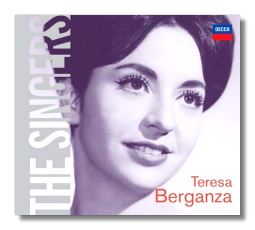
Teresa Berganza
- Arias from:
- Le nozze di Figaro
- La clemanza di Tito
- Così fan tutte
- Il barbiere di Siviglia
- Semiramide
- L'italiana in Algeri
- La Cenerentola
- Wolfgang Mozart: Ch'io mi scordi di te?… Non temere, amato bene
- Granados: La maja dolorosa
Teresa Berganza, mezzo-soprano
Various accompaniments
Decca 467905-2 ADD 68:41

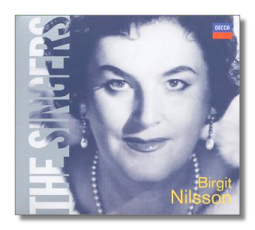
Birgit Nilsson
- Arias from:
- Fidelio
- Der Freischütz
- Nabucco
- La forza del destino
- Tristan und Isolde
- Götterdämmerung
- Tannhäuser
- Die Walküre
- Adolphe-Charles Adam: O holy night
- César Franck: Panis angelicus
- Gruber: Silent Night
Birgit Nilsson, soprano
Various accompaniments
Decca 467912-2 ADD 70:15

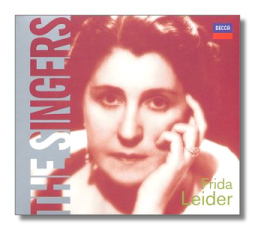
Frida Leider
- Arias from:
- Le nozze di Figaro
- Fidelio
- Oberon
- Tannhäuser
- Tristan und Isolde
- Parsifal
- Die Walküre
- Siegfried
- Götterdämmerung
- Ludwig van Beethoven: Ah! perfido
Frida Leider, soprano
Various accompaniments
Decca 467911-2 ADD monaural 68:56

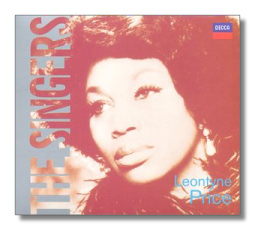
Leontyne Price
- Arias from:
- Aïda
- Un ballo in maschera
- Otello
- Ernani
- George Frideric Handel: Messiah: He shall feed his flock; How beautifare the feet
- César Franck: Panis angelicus
- William J. Kirkpatrick: Away in a Manger
- Wade:
- O come, all ye faithful
- What Child is this?
- Niles:
- I wonder as I wander
Leontyne Price, soprano
Various accompaniments
Decca 467913-2 ADD/DDD 73:41

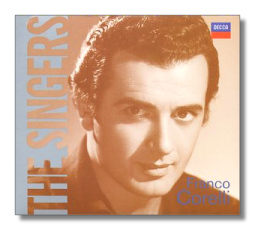
Franco Corelli
- Arias and Scenes from:
- Otello
- La Gioconda
- Manon Lescaut
- Tosca
- Francesca da Rimini
- Faust
Franco Corelli, tenor
Various accompaniments
Decca 467918-2 ADD 74:14
Decca's new "The Singers" series is dedicated to writer John Ardoin (1935-2001), a man whose love for the human voice was infinite. Ardoin lived long enough to contribute the booklet notes for three of these five initial releases. Many more are on their way, or already here as you read this review. In preparing this series, Decca has had the Universal Classics catalog at its disposal, so material originally on Philips, Deutsche Grammophon, and Westminster will be appearing beside Decca recordings.
The accompanying booklets are somewhat terse, but that's because these CDs can also be popped into a PC or Macintosh. This will launch a photo gallery, a discography, and a "profile" for each singer, plus and texts and translations of the sung material. In the long run, I think collectors will see these "multimedia" offerings as gimmicky, and not a replacement for good printed materials. Perhaps I am wrong. As I reviewed these five discs, I got the feeling, at times, that Decca was more concerned about the visual presentation than the musical contents. The look is slick. The music and recordings themselves haven't been thoroughly considered, however.
Nevertheless, the Berganza disc is a total delight. Of these five initial releases, this is the one to get, because it presents the ideal mix of voice, repertoire, and recording. The six Mozart arias that open the disc come from a recording that the mezzo-soprano made in London in 1962. Berganza is a boyish – but not cloying – Cherubino in his two arias, heroic in "Parto, parto" from La clemanza di Tito, grandly diva-serious in "Come scoglio," and lightheartedly philosophical in "E' amore un ladroncello" (both from Così fan tutte). The inclusion of the concert aria Ch'io mi scordi di te agreeably links the literal militancy of "Parto, parto" with the romantic militancy of "Come scoglio." In the concert aria, Geoffrey Parsons is the cool and classy piano soloist. John Pritchard, an eminent Mozartian, conducts these six arias well. Five Rossini arias, recorded three years earlier with conductor Alexander Gibson, are even more brilliant examples of Berganza's artistry. Rich tone, agility, and personality combine to make her unique. She fires off the cleanest and most articulated runs without a trace of strain or unwanted aspirates. Rosina and Isabella, Rossini's minx-like heroines, are imbued with pert femininity – men (and Marilyn Horne), get out of the way! "Bel raggio lusinghier" is a jaw-dropping showpiece for the mezzo-soprano, even the character of Semiramide seems unsuited to her. In the La Cenerentola finale, Berganza's humanity shines through – Cinderella's kindness is not forgotten in the coruscating brilliance of her happiness.
The inclusion of Granados's La maja dolorosa reminds us of Berganza's Spanish heritage. Recorded in 1975, these songs demonstrate that Berganza can simmer just as well as she can bubble.
Despite the fact that Swedish-born Birgit Nilsson spent most of her recording career with Decca, her "Singers" disc is oddly piecemeal. Little from her complete operatic recordings is included, although some of the heroines represented here (Fidelio's Leonore, Elisabeth) could have been so honored. Instead, Decca has chosen to dwell on recital discs recorded in 1962 and 1963, with conductors Argeo Quadri and Edward Downes, respectively. Verdi is represented by Nabucco's Abigaille and Forza's Leonora, and few would agree that the latter is a role for which Nilsson was ideally suited. Her Aïda, represented (at least in excerpts) in the Decca catalogue, would have been a more sensible choice. Lady Macbeth, another role she recorded for Decca, would have trumped her Leonora easily. And, although it was an interesting choice to include Nilsson's Sieglinde as a complement to her Brünnhilde, other "no brainer" roles have been excluded (Salome, Elektra) from this compilation.
If you don't want to represent Nilsson's essential Brünnhilde by "Hojotoho!," then you must include an Immolation Scene. Decca has done this, but instead of taking one from the classic Solti recording – and Solti's name is conspicuously absent on this CD as well – they have taken it from Böhm's more variable Bayreuth recording. Then, insult has been added to injury by ending the excerpt prematurely – an inconclusive immolation is no immolation at all. The disc comes to an incongruous end with two Christmas carols and Franck's "Panis angelicus." The latter selection is included on Price's disc as well (see below), and the duplication hardly seems necessary, given Universal's huge resources.
The CD devoted to Berlin-born Frida Leider makes Nilsson's seem even more redundant. How unusual, in a series generally representing singers who were active during the stereo era, to include a sample of Leider's acoustic recordings! A CD entirely dedicated to Leider certainly has a place (and little competition) even today. She was born in 1888 and died as late as 1975, but her career as a singer pretty much came to a halt when the Nazis came to power – her husband was a Jew. These recordings were made between 1921 and 1925 when she was at her peak.
There were many overlapping roles between Nilsson's career and Leider's, and these are reflected by their respective CDs. Both voices could be a focused and penetrating as a diamond-cutting laser, yet, of the two, Leider's is the more warm and human. Perhaps this is because she was more interested in the physical aspects of acting, not just in how a character can be established through the voice alone. (One of her idols, in fact, was the great Italian actress Eleanora Duse.)
Everything on this CD is of the highest vocal and interpretive artistry – try the fearless runs at the end of "Abscheulicher!"- even if the original recordings are hissy. (Decca does not credit a transfer engineer). A young Lauritz Melchior can be heard in the Act One love duet from Die Walküre, and an even more impressive heldentenor named Fritz Soot – who was he? – contributes his Siegfried to scenes from Siegfried and Götterdämmerung.
Most of Leontyne Price's recording career was spent working with labels other than Universal Classics', notably with RCA Victor. By the time that she and Zubin Mehta recorded their Verdi collection in Tel Aviv (1980), her voice was not as dependable as it once was: the lower range was becoming more and more covered, and her upper range, once unforced and melting, was becoming unnaturally penetrating. There's little trace of vocal discomfort in these six arias, but compared to her older recordings, these later versions lack technical ease and interpretive freshness; they are very "diva." Even Desdemona's "Willow Song" is forbidding. Those wanting to sample Price's Verdi really need to go back to the 1950s and 60s.
In May 1983, Price went to Montréal to record a Christmas CD with Charles Dutoit and his orchestra, who just recently had been recognized as world-class. Here, repertoire was selected to complement her vocal resources at the time – still pretty good, but again, not what they once were. It's fun to hear Price singing "He shall feed his flock" with a baritonal richness that would not have been foreign to Dame Clara Butt. "I Wonder as I Wander" is moving in its simplicity. Elsewhere, there's a plumpness to this production – the intersection of a huge operatic voice (with choir and orchestra) and simple seasonal music – that strikes me as too big to be devout and too serious to be celebratory. I think neither this collection nor the Verdi arias with Mehta are regarded as being anywhere near the best mementos of this soprano's career. Still, this CD is moderately enjoyable.
Like Price, tenor Franco Corelli's career on records was not centered around what now are the Universal Classics labels. As a result, the contents of this "Singers" CD are not completely typical of his work. Corelli did, however, record a complete Tosca for Decca in 1966 (with Birgit Nilsson and conductor Lorin Maazel) and a Faust in the same year (with Joan Sutherland, Nicolai Ghiaurov, and conductor Richard Bonynge), and two scenes or arias from each of those sets are included here. The Tosca is a sterling affair, and Corelli's trumpeting, emotional singing is highly apt for the impetuous Cavaradossi. The Faust was widely criticized at the time for Sutherland's droopy Marguerite, Bonynge's routine conducting, and Corelli's unidiomatic French. Thirty-five years later, these no longer seem as problematic, and there is plenty of enjoyment to be had, particularly in Corelli's opening scene with Ghiaurov's sinister Méphistophélès.
In 1972, Corelli recorded a duet album with soprano Renata Tebaldi. This has been included here as well. The highlight of the original LP was the long scene from Riccardo Zandonai's verismo curiosity Francesca da Rimini, and the two singers make a good case for it. Scenes from La Gioconda and Manon Lescaut filled out the LP, and are retained here. Tebaldi's voice had become a little ripe at this point in her career, but she gives 100% here, as does Corelli.
Corelli never performed Verdi's Otello. A taste of what could have been came, again in 1972, during a Metropolitan Opera gala, when Corelli and soprano Teresa Zylis-Gara performed the Act One love duet. (The conductor was, of all people, Karl Böhm.) This is an ardent performance. It does Corelli full credit, and I am glad that it was reissued here, with the Tebaldi-Corelli LP.
Copyright © 2002, Ray Tuttle


















